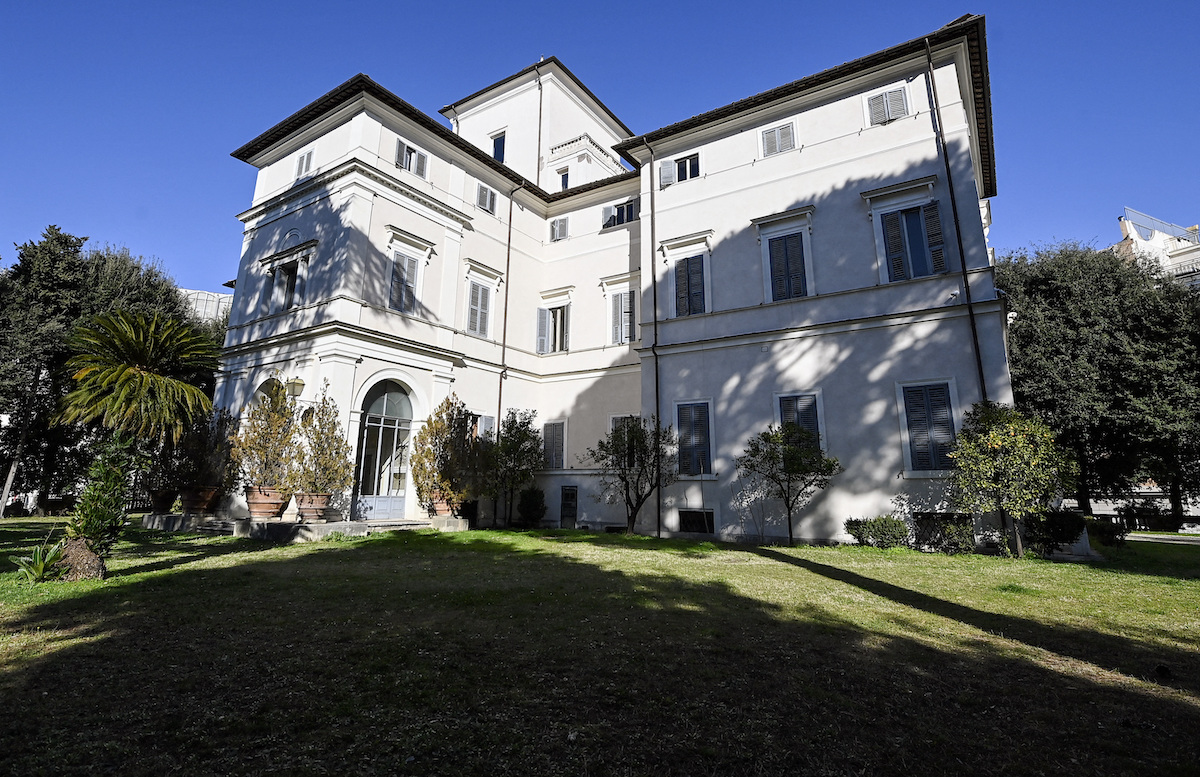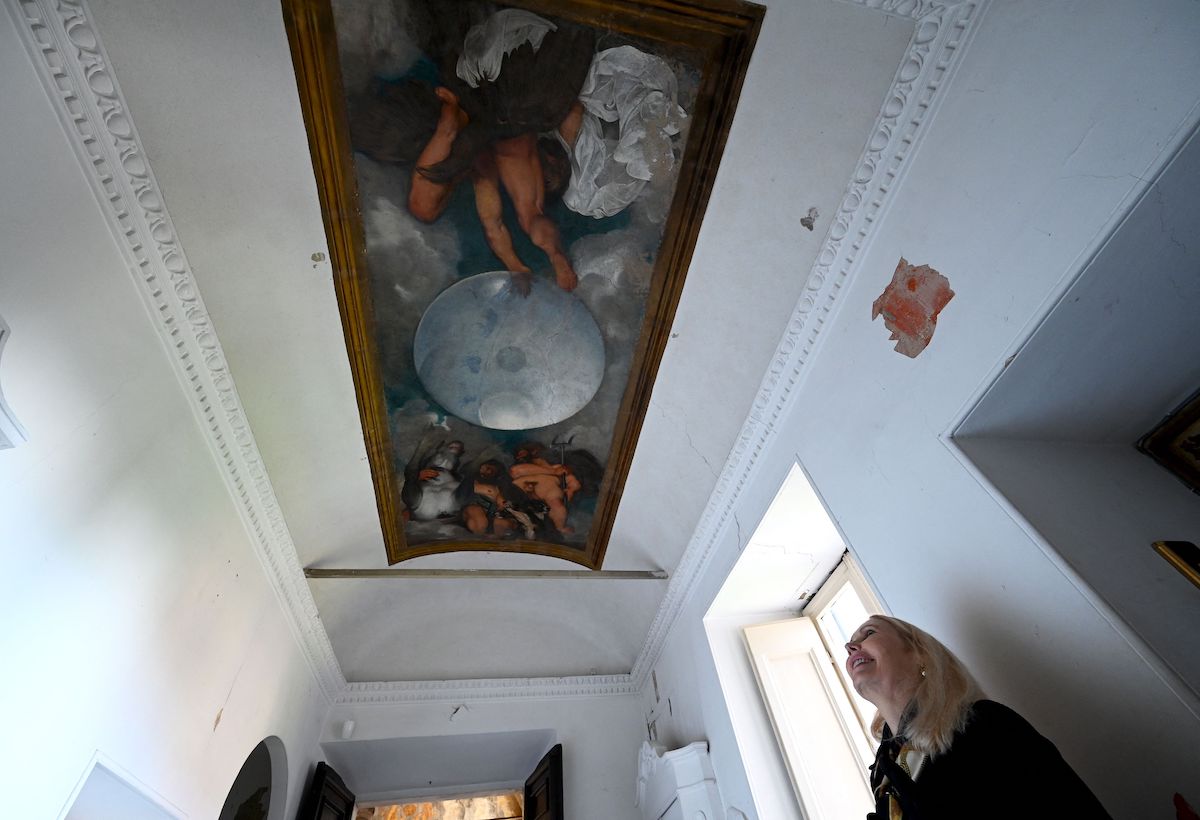A Texas-born princess piled her four yapping bichon frise dogs into a taxi Thursday after being evicted, following a bitter inheritance dispute, from a historic villa in Rome that contains the only known ceiling painted by Caravaggio.
Princess Rita Jenrette Boncompagni Ludovisi, nee Rita Carpenter, abandoned the Casino dell’Aurora off the swank Via Veneto hours after Carabinieri police arrived to enforce a court-mandated eviction order. Before she had even left, a locksmith changed the locks on the big green front door.
Her dramatic exit — one of the dogs briefly escaped as she spoke to journalists on the street — capped a remarkable, years-long soap opera that exposed the dirty laundry of one of Rome’s aristocratic families. The Boncompagni Ludovisi are perhaps best known for having produced Pope Gregory XIII of Gregorian calendar fame. But lately they have attracted more attention due to the inheritance dispute and court-mandated auction of their famous villa in the heart of Rome.
“I feel like I’m in a surreal movie, like Sartre’s ‘No Exit,’” the princess said on the street, interrupted repeatedly by a barking fluffy white dog in her arms and three others at her ankles.

Casino dell’Aurora, also known as the Villa Ludovisi, has been in the Ludovisi family since the early 1600s. After Prince Nicolo Boncompagni Ludovisi died in 2018, the villa became the subject of an inheritance dispute between the children from his first marriage and his third wife, the San Antonio, Texas-born Princess Rita, whom he married in 2009.
Previously, she had been married to former U.S. Rep. John Jenrette Jr. of South Carolina.
The children have argued that the home, built in 1570, belongs to them, that their grandfather intended for them to inherit it and that their late father abused them and mismanaged his fortune. They mounted a multi-pronged legal campaign to get control of the property so it can be sold.
The latest chapter in the saga came in January after Rome Judge Miriam Iappelli issued an eviction order, accusing the princess of having violated a previous order forbidding her from conducting guided tours of the property.
Boncompagni Ludovisi has said the tours were necessary to raise money to maintain the villa. In addition, the judge found that the princess had failed to maintain the home in a “good state of conservation” after an exterior wall crumbled.
One of the heirs, Prince Bante Boncompagni Ludovisi, was on hand Thursday at the villa to watch “that woman,” as he refers to his father’s widow, leave the property.
“This house needs renovations. The pipelines of water need to be restored and the frescoes are in danger,” he told reporters. “This is a country: We have our police, we have our judges and you need to respect our country and our laws if you stay here.”
It’s not clear who will now undertake the work on the house, which needs at least 11 million euros in renovations to bring it up to code.

The villa was put on the court-ordered auction block last year as part of the inheritance dispute and assigned a court-appraised value of 471 million euros ($533 million), in large part due to the Caravaggio. After the minimum bid of 353 million euros ($400 million) failed to get any takers in the first auction, the price was progressively lowered in a series of successive auctions, with more scheduled until a buyer is found.
The Caravaggio ceiling graces a tiny room off a spiral staircase on the second floor. It was commissioned in 1597 by a diplomat and patron of the arts who asked the then-young painter to decorate the ceiling of the small room being used as an alchemy workshop. The 2.75-meter (9-foot) wide mural, which depicts Jupiter, Pluto and Neptune, is unusual: It’s not a fresco, but rather oil paint on plaster, and represents the only ceiling mural that Caravaggio is known to have painted.
While the villa’s fate is uncertain, so too is that of the princess.
Vowing that the truth will eventually come out (and announcing a book deal), Boncompagni Ludovisi insisted she had cared for the villa during her two decades living there and digitized the family’s archive, with the help of Rutgers University.
“I see no logic in this. I was a good custodian for the villa,” she said.
She didn’t say where she would go next, though she noted that the Episcopal Church in Rome had reached out to help.
“I love Italy and I’m so sorry to have such a brutal ending to what has been a labor of love for 20 years,” she said. Her book, on the villa and its famous ceiling, is expected to be published at the end of the year.
“It’s dedicated to my husband, Nicolo,” she said, before speeding off with the dogs in a taxi into the Roman traffic.

0 Comments